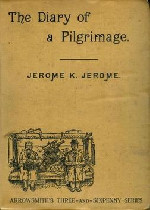
“It is not a large house,” I said. “We don’t want a large house. Two spare bedrooms, and the little three-cornered place you see marked there on the plan, next to the bathroom, and which will just do for a bachelor, will be all we shall require—at all events, for the present. Later on, if I ever get rich, we can throw out a wing. The kitchen I shall have to break to your mother gently. Whatever the original architect could have been thinking of—” “Never mind the kitchen,” said Dick: “what about the billiard-room?”

His name is George, generally speaking. "Call me George!" he says to the heroine. She calls him George (in a very low voice, because she is so young and timid). Then he is happy. The stage hero never has any work to do. He is always hanging about and getting into trouble. His chief aim in life is to be accused of crimes he has never committed, and if he can muddle things up with a corpse in some complicated way so as to get himself reasonably mistaken for the murderer, he feels his day has not been wasted.

The Observations of Henry(亨利的观察) 立即阅读
The Observations of Henry is a delightful anthology of short stories. Some are witty. Some are downright humorous. Others have a touch of appealing pathos. And yet others just stir the imagination towards thinking of the more romantic side of life in 19th century Britain. The stories are cleverly linked as chapters from the reminiscences of a waiter who is analogous to the good old English butler. This is bedtime reading at its best.

Years ago, when I was very small, we lived in a great house in a long, straight, brown-coloured street, in the east end of London. It was a noisy, crowded street in the daytime; but a silent, lonesome street at night, when the gas-lights, few and far between, partook of the character of lighthouses rather than of illuminants, and the tramp, tramp of the policeman on his long beat seemed to be ever drawing nearer, or fading away, except for brief moments when the footsteps ceased, as he paused to rattle a door or window, or to flash his lantern into some dark passage leading down towards the river.

The Angel and the Author - and Others(天使与作者) 立即阅读
In this story the author dreams that he is dead and is going up and up. Now he feels that he has lost all opportunities to do good. He tries to recall whatever good he had done during his life time when he was living in this world. He realizes that he has done no deed of great benevolence during his life time. The angel who records good deeds of people is flying with him. He asks him what deeds of goodness he has recorded for him.

Sketches in Lavender, Blue and Green(蓝色和绿色的薰衣草草图) 立即阅读
The advantage of literature over life is that its characters are clearly defined, and act consistently. Nature, always inartistic, takes pleasure in creating the impossible. Reginald Blake was as typical a specimen of the well-bred cad as one could hope to find between Piccadilly Circus and Hyde Park Corner. Vicious without passion, and possessing brain without mind, existence presented to him no difficulties, while his pleasures brought him no pains. His morality was bounded by the doctor on the one side, and the magistrate on the other.

All Roads Lead to Calvary(难逃磨难) 立即阅读
All Roads Lead to Calvary is a 1919 novel by the British writer Jerome K. Jerome. It was one of the last works written by Jerome, better known for his Three Men in a Boat, and shows the influence of the First World War on him. It is a Bildungsroman in which a Cambridge University educated woman Joan Allway becomes a journalist and then a wartime ambulance driver. She encounters various different people, gaining new experiences and confronting many of the moral issues of the day.

Idle Ideas in 1905(1905年的杂想) 立即阅读
Back in 1905 Jerome K. Jerome shared his thoughts on a variety of subjects, including "Should Women Be Beautiful?", "Should Soldiers Be Polite?" and "Is The American Husband Made Entirely Of Stained Glass?". Each subject is analysed and commented on in the witty and satirical style we've grown to expect from the author.

Diary of a Pilgrimage(朝圣路日记) 立即阅读
Diary of a Pilgrimage is a novel by Jerome K. Jerome published in 1891. It tells of a trip undertaken by Jerome and his friend "B" to see the Oberammergau Passion Play in Germany. They travel by train from London Victoria to Dover and have a rough overnight crossing of the Channel to Ostend and thence by train to Cologne where they spend a night in a hotel. The following day they visit Cologne Cathedral before catching the train to Munich, travelling alongside the Rhine. They spend Sunday in Munich where Jerome practices his German before catching a train to Oberau and then a carriage to Oberammergau to see the play. They return via Heidelberg.